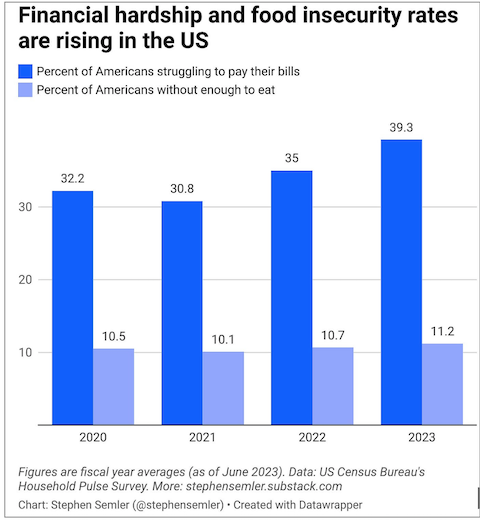
Index of US precarity per household survey, from Stephen Semler, via Indi; so much for “building back better”
This month’s links are rather heavy on stuff from Indrajit Samarajiva, since he’s really been on a roll of late. His latest post on precarity (high levels of citizen desperation, uncertainty, and anxiety) about financial solvency and food security features the chart above. The richest country in the history of the world and 4 out of 10 of its citizens are worried about how they’re going to pay next month’s bills. This is a portrait of collapse. And Biden is raising interest rates to “cool” the economy by creating even more poverty, anxiety and precarity!
The only logical answer to this crisis is a set of actions that, thanks to seven decades of propaganda, cannot even be spoken aloud in political circles in the west — price controls, speculation taxes, excess profits taxes, wealth taxes, highly graduated tax rates, especially on ‘capital gains’ and passive investment income, banning usury (especially by credit card companies), nationalization of essential industries, rationing of non-renewable energy, slashing of military expenditures, and the smashing of oligopolies and reinstitution and enforcement of anti-monopoly laws.
Only a rapid and radical redistribution of wealth and income (and the power that goes along with it) can prevent horrific economic collapse over the next decade. We are utterly debt-hobbled and running out of cheap resources of all kinds. And since governments since Reagan/Thatcher have given away the public resources and public wealth that will be needed to cushion the blow to the poor and working class that economic collapse will cause, there will be no way to claw our way out of depression by reinvesting in things people need (like fixing our crumbling infrastructure and providing essential public services) and by paying people to provide them when the ‘private sector’ will not.
As the 40%-and-growing (and much higher in many nations) precariat stagnates into the preteriat (those left behind and ignored in all economic, political and social decision-making), anger, resentment, distrust and intolerance is only going to grow. That doesn’t mean revolutions are nigh (for reasons Aurélien has repeatedly explained). What it means instead is that, as collapse worsens, our embittered, mistreated citizens are going to be both unwilling and unable to work together to help each other cope with collapse, beyond our narrow circles. The upshot of that is that economic, political and ecological collapse will be accompanied by the fourth horseman that Dmitry Orlov warned us about — social collapse.
COLLAPSE WATCH

part of a cartoon by Canadian cartoonist Rosemary Mosco about Ottawa’s Rideau Canal; thanks to Indi for the link
Collapse status report: Erik Michaels summarizes the latest news on collapse and explains once more why “we can’t all just” do “what’s needed” to mitigate it. Thanks to Paul Heft for the link.
17ºC surpassed for the first time ever: The very early stages of the latest El Niño have already produced the four hottest days on record.
Ecosystem collapses happening much sooner than expected: The impact of unexpected feedback loops on the acceleration of collapse. Thanks to Just Collapse for the link.
90 seconds to midnight: Maybe it’s time to replace the clock metaphor with a time bomb.
Navigating collapse: Post-Carbon’s latest report talks about ecological and social collapse, but strangely omits economic collapse as a major contributor.
We’re not in control: Indi muses on how our illusion of agency and free will has led us to believe we can do things to avert collapse, when we cannot.
LIVING BETTER
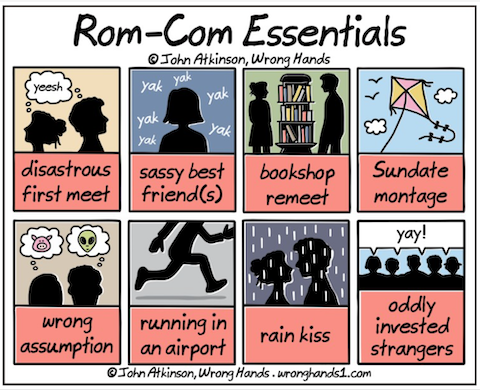
another gem from John Atkinson, of ‘abridged classics’ fame
How community works in Vermont: A resident remarks on how those in her state have created community in unique and pragmatic ways.
The self as illusion: Neuroscientist Chris Niebauer on why there is no such thing as the ‘self’. Thanks to Deanna Pumplin for the link.
How diplomacy really works: Aurélien describes the thorough training that most of the world gets, to learn to work effectively as diplomats in foreign countries, and how the ‘exceptionalist’ ‘my way or the highway’ US, once again, goes it alone.
Want to reduce crime? Slash your police force: US cities whose police forces have been decimated by mass resignations over restrictions to their power or minority hiring, have seen crime rates drop.
When everyday care tasks are a struggle: A counsellor suggests a new approach to coping when mental or physical obstacles prevent getting basic chores done. Thanks to Theresa Purcell for the link.
How email has changed reading and writing: Indi explains why email has endured despite all the other modes of communication available to us.
How to solve homelessness: How about trying spending the money we now spend policing the homeless, on building homes for them instead?
POLITICS AND ECONOMICS AS USUAL

Edelman Trust Index 2022-23, per surveys of the general population in each country; contrast each country’s view of its own government and media, with what we are ‘taught’ about those countries, and with other countries’ citizens’ shifting view of China per Pew Research, shown in the chart below; thanks to Indi for the link (right click image and open in new tab to see full size)
Corpocracy, Imperialism & Fascism: Short takes (thanks to John Whiting for many of these links):
- The corporate owners of the Republicans might be losing control of its fascism-embracing right wing extremists
- The west continues to perpetuate the nonsense that Ukraine can ‘win’ the war, and the result is thousands of Ukrainian lives needless lost; the war is over except for the posturing and still Zelenskyy and the west are trying to escalate it, this time with cluster bombs that even Canada’s toady Trudeau objected to
- Background on the Prigozhin ‘rebellion’, and a warning to Democrats to stop turning off voters with endless war-mongering; and Biden’s mishandling of his foreknowledge of the ‘rebellion’; and Biden’s insane appointment of right-wing war criminal Elliott Abrams to a senior post
- Further Biden incompetence: He has now walked back his promise of NATO membership for Ukraine and his promise to support Taiwan independence from China (at least, that’s what Blinken said, though the doddering Biden doesn’t appear to really understand what he said)
- Israel accelerates atrocities in the occupied Palestinian territories
- Georgia’s School of the Americas aka WHINSEC continues to train and equip Latin American dictators in murder, torture, and repression of protests
- RFK Jr continues to attract strange bedfellows to his podcast
- You’d think that a Christian religious cult that carried out the brutal murder and starvation of over 1,000 of its members earlier this year would have been covered in the media, no?
- Some Canadian media at least allow Russians airtime to refute propaganda
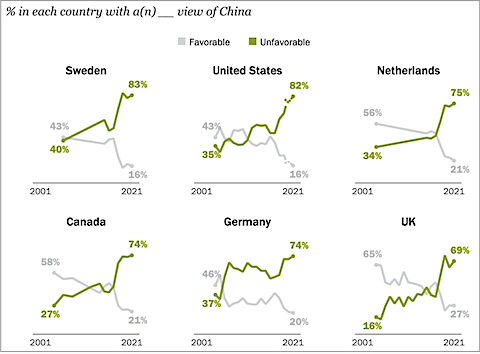
Pew Research surveys of other countries’ view of China, over time; if you ever doubted the power of propaganda, this should set you straight; the chart below is kind of the icing on the cake; thanks to Indi for the links to all these charts
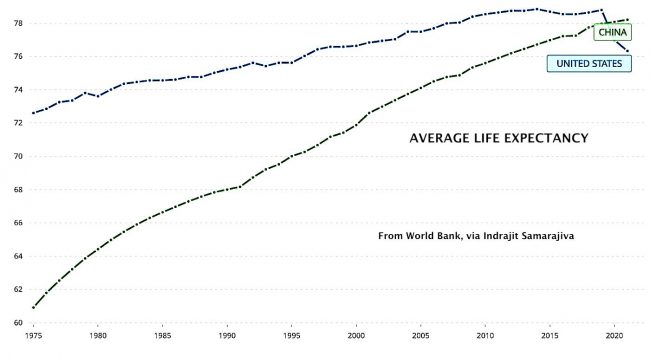
Propaganda, Censorship, Misinformation and Disinformation: Short takes:
- Chris Hedges sums up all the lies about the Ukraine débacle, the US’s latest and most expensive and dishonest war yet
- All about the fake ‘Chinese Police Stations’ con
- Radio New Zealand editor fired for daring to report balanced news on Ukraine
- Rebecca Watson on the latest (again?!) misinformation about UFOs and the never-ending lab-leak hypothesis
FUN AND INSPIRATION

from the memebrary; original source unknown
Impromptu summer: A random encounter at a public piano at a train station results in a remarkable version of Vivaldi’s “Summer” from The Four Seasons.
AI and the “tasker underclass”: An inside look at the grueling, awful work needed to produce the dataset for AI tools. Thanks to Raffi Aftandelian for the link.
Paul Williams is still not dead: 2000 people, and one frog, sing Rainbow Connection at the Lincoln Center.
Kurt Vonnegut on AI: The author warned that the greatest danger of AI would be its exploitation by extreme capitalism. Thanks to John Whiting for the link.
THOUGHTS OF THE MONTH
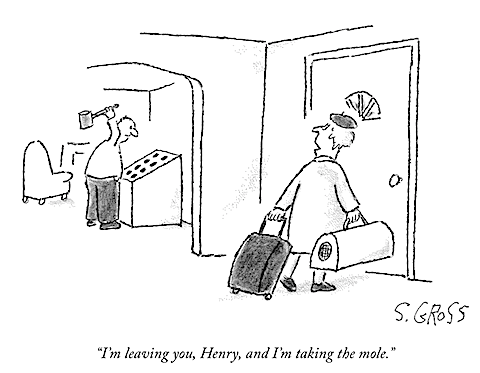
another of the late (he died in May) Sam Gross‘ startlingly original cartoons; “I’m taking the mole” should be a meme
From Caitlin Johnstone on liberals’ devil’s bargain with propagandists:
Western liberals are in effect being offered a political bribe by the empire: support the restrictions on political speech we are constantly pushing for, and it will undermine the interests of your political rivals. This bribery has made “liberals” far more tyrannical. Liberals play along because they’ve been convinced at every opportunity that restricting speech is the best way to fight hate, right wing extremism, health misinformation and malign foreign influence, but in so doing they’re supporting the most tyrannical regime on earth.
So now we’re in this bizarre situation where being “liberal” effectively means supporting censorship to silence your political enemies for the benefit of the most murderous and tyrannical people on this planet.
From Indrajit Samarajiva on the real sharing economy:
One of the lies of capitalism is that it controls everything. It doesn’t even govern most of your day. Every person sharing a french fry is a closet communist, they’re just unaware. Almost everyone that works is working to give those resources away at the end of the day. To share. The lie is that we’re automatons driven by self-interest, and it’s just not true. We love our children, we love each other, we love our schools, our communities, we want to give and take and share…
We think [capitalism] is just how it’s gotta be. But it ain’t. Look at your own life and realize how much of it — the good parts — are lived in the real sharing economy. Have a washing machine break down, need a cup of sugar — the threads of a different way of living are all around us. We are communities. We are families. We are mammals. Maybe we go to market sometimes, but we don’t need to live in the fucking market. We can live with our family, with our friends, and we can give and take what we need without currency. These are the old ways and they still work. We don’t have to work so damn hard for everything.
From Federico Moramarco, from The City of Eden
One Hundred and Eighty Degrees
Have you considered the possibility
that everything you believe is wrong,
not merely off a bit, but totally wrong,
nothing like things as they really are?
If you’ve done this, you know how durably fragile
those phantoms we hold in our heads are,
those wisps of thought that people die and kill for,
betray lovers for, give up lifelong friendships for.
If you’ve not done this, you probably don’t understand this poem,
or think it’s not even a poem, but a bit of opaque nonsense,
occupying too much of your day’s time,
so you probably should stop reading it here, now.
But if you’ve arrived at this line,
maybe, just maybe, you’re open to that possibility,
the possibility of being absolutely completely wrong,
about everything that matters.
How different the world seems then:
everyone who was your enemy is your friend,
everything you hated, you now love,
and everything you love slips through your fingers like sand.




